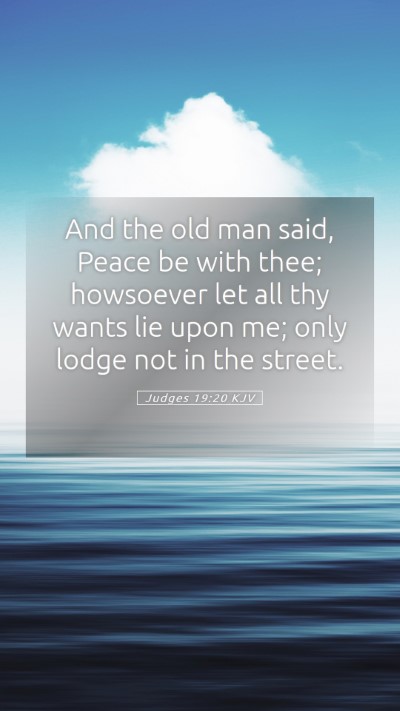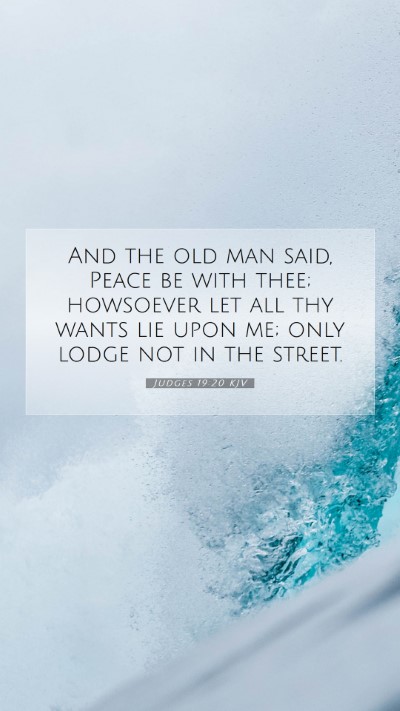Bible Verse Commentary: Judges 19:20
Verse: Judges 19:20 - "And the old man said, Peace be with thee; howsoever let all thy wants lie upon me; only lodge not in the street."
This verse presents a critical moment in the narrative of Judges, illustrating hospitality amidst a perilous environment. The setting here is a reflection of the societal norms during the time of the Judges in Israel, where personal safety and communal bonds were essential.
Understanding Judges 19:20
Judges 19:20 encapsulates themes of hospitality, protection, and the dire conditions of life in ancient Israel. The old man’s willingness to take the strangers into his home speaks volumes about the importance of hospitality in the ancient Near East.
Key Insights from Commentaries
-
Matthew Henry:
Matthew Henry emphasizes the old man’s role as a protector and the significant moral responsibility he undertakes in offering shelter to the traveler. He notes how the old man first addresses the visitors with peace, suggesting that his home is a place of tranquility amidst a potentially dangerous environment. Moreover, Henry asserts that this encounter reflects the low moral state of society at that time, highlighting the necessity of such an act of kindness.
-
Albert Barnes:
Albert Barnes points out the contrast between the hospitality shown by the old man and the dangers lurking in the streets. He acknowledges that during this era, lawlessness often prevailed, making public spaces unsafe. Barnes also remarks on the necessity of community and fellowship as a buffer against these dangerous realities, illustrating that the old man's actions are not merely personal kindness, but a communal duty.
-
Adam Clarke:
Adam Clarke focuses on the socio-religious implications of the interaction. He highlights that the old man was likely aware of the prevailing wickedness in Gibeah and sought to provide refuge and care for the weary traveler. Clarke stresses that hospitality is a virtue that reflects one's character and relationship with God. The old man's willingness to bear any burdens of the guests speaks to a profound moral duty rooted in the cultural ethos of care and protection.
Historical Context of Judges 19:20
The book of Judges narrates the turbulent times of Israel's history during the absence of unified leadership following the death of Joshua. Society was characterized by moral decay and disunity, making passages like Judges 19:20 significant markers of humanity and compassion against a backdrop of moral failure.
Application of Scripture
Understanding Judges 19:20 offers valuable insights into hospitality and personal responsibility. In today’s context, the message encourages us to offer kindness, support, and refuge to those in need, reminding us of our communal obligations regardless of the circumstances.
Significance of Hospitality
Hospitality in biblical terms is not just about providing shelter, it is cemented in the commandments prescribed in the law to care for the strangers and the poor (Exodus 22:21). The old man’s actions serve as a model of obedience to God's call to love our neighbors and practice kindness.
Related Cross References
- Genesis 18:1-8 - Abraham's hospitality towards visitors.
- Matthew 25:35-40 - Jesus’ teaching on serving the least of these as serving Him.
- Hebrews 13:2 - Encouragement for believers to show hospitality to strangers.
Conclusion
In summary, Judges 19:20 highlights the urgent call for hospitality and community care in a fragmented society. It serves as an illustration of moral integrity that transcends the vulnerability and moral corruption of the time. Through the lens of various commentaries, readers are encouraged to reflect on their own responsibilities towards others and the importance of community in living out biblical teachings today.


